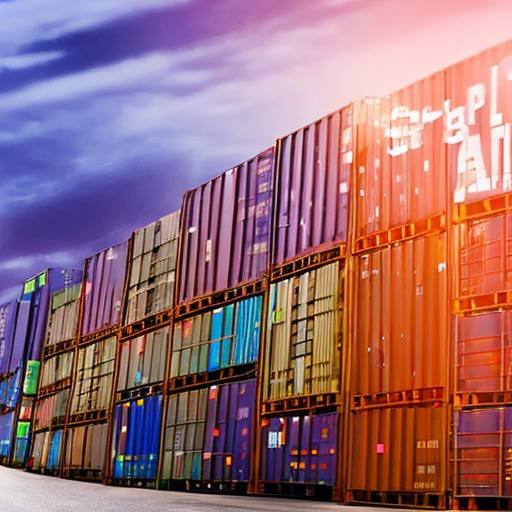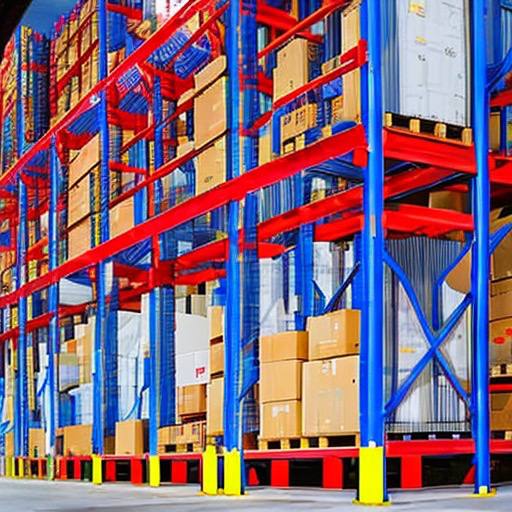Supply Chain and Logistics: Innovative Financing, Payment, and Tracking Solutions for Global Trade
In today’s global economy, businesses engaged in global trade and supply chain logistics face a wide range of challenges, including managing complex supply chains, navigating global regulations, and managing cash flow. However, technological advancements and the rise of the digital economy have brought about innovative solutions that are transforming the way businesses operate in the supply chain.
One of the key areas where businesses can leverage technology is through fintech solutions, which offer innovative financing, payment, and tracking solutions for global trade. Fintech solutions have enabled businesses to streamline their operations, reduce costs, and improve efficiency, ultimately leading to improved profitability and growth.

By using fintech solutions, businesses can improve cash flow management, automate payment processing, and gain real-time visibility into transaction data. Additionally, fintech solutions can enhance transparency and traceability in the supply chain, enabling businesses to track the movement of goods and monitor their progress through the supply chain, from the manufacturer to the final destination.
In this article, we will explore the benefits of using fintech solutions in global trade and logistics, including tracking solutions and payment processing. We will also discuss the role of embedded finance in the supply chain and how it can enable businesses to access financial services without leaving the logistics platform. With the rise of fintech innovations, businesses have the opportunity to transform their supply chain operations and stay ahead of the competition in the global marketplace.
Benefits for Supply Chains
The integration of fintech solutions in the supply chain has brought about significant benefits for businesses engaged in global trade and logistics. By leveraging fintech solutions, businesses can improve their supply chain operations and gain a competitive edge in the global marketplace. Here are some of the significant benefits of using fintech solutions in the supply chain:
Improved Cash Flow Management
Traditional payment methods such as letters of credit can be time-consuming and costly, but fintech solutions enable businesses to make payments faster and more efficiently, reducing the need for manual processing and the associated costs. By automating payment processing, businesses can reduce the risk of errors, improve the accuracy of their transactions, and accelerate cash flow.
Real-time Visibility
Fintech solutions provide real-time visibility into payment and transaction data, enabling businesses to track their cash flow more accurately. This level of visibility allows businesses to make informed decisions about their supply chain operations, such as identifying potential bottlenecks and optimizing their supply chain for efficiency. With real-time data, businesses can respond quickly to any issues that arise in the supply chain, minimizing the risk of delays and disruptions.
Transparency and Traceability
With embedded finance and tracking solutions, businesses can track the movement of goods and monitor their progress through the supply chain, from the manufacturer to the final destination. This level of transparency allows businesses to identify any issues that may arise and take action to address them promptly, reducing the risk of delays and disruptions. Furthermore, tracking solutions enhance traceability, enabling businesses to identify the source of any quality issues and take corrective action to prevent future occurrences.
Enhanced Efficiency
By automating manual processes, such as payments processing and data entry, businesses can reduce the risk of errors and improve the accuracy of their transactions. This level of efficiency allows businesses to optimize their supply chain operations, reduce the time and cost associated with transporting goods, and ultimately, improve profitability.
Access to Financing
Embedded finance solutions enable businesses to access financial services such as credit and insurance without leaving the logistics platform. By leveraging these services, businesses can invest in their supply chain operations, optimize their operations, and ultimately, grow their business.
Utilizing fintech solutions in the supply chain has a multitude of benefits, including the opportunity for businesses to strengthen their cash flow management, acquire real-time visibility, improve their efficiency, increase their transparency and traceability, and access financial services. Using these technologies enables organizations to improve their supply chain operations, cut costs, and maintain a competitive advantage in the global market space.
Embedded Finance
Embedded finance is an innovative approach to providing financial services by integrating financial products and services into non-financial products and services. In the context of the supply chain, embedded finance enables businesses to access financial services such as payments processing, credit, and insurance, without leaving the logistics platform.
The integration of financial services into the supply chain has significant benefits for businesses, enabling them to streamline their operations, reduce costs, and improve efficiency. Here are some of the significant benefits of using embedded finance in the supply chain.
Embedded finance solutions make it possible for businesses to streamline the processing of payments between consumers and suppliers on the platform for logistics. By automating the workflow for payments processing, businesses can save time and effort while also increasing accuracy and efficiency in their operations. When the mistake rate is reduced and there is an increase in cash flow, there is a corresponding rise in profitability.
When it comes to securing financing for a company, the integration of financial services within the logistics platform removes the requirement that the company through traditional credit checks. Embedded finance solutions provide businesses with improved access to specialized funding through the analysis of transaction data and the delivery of a credit score. With the assistance of financing, businesses are able to improve the procedures involved in their supply chains, invest in chances for growth, and extend their operations.
Improved Risk Management: By providing businesses with access to various insurance options, embedded finance solutions are able to assist companies in mitigating the risks associated with international trade and logistics. If a company’s logistics platform includes insurance services, the company’s exposure to risks like damaged cargo, theft, and non-payment can be reduced, which in turn reduces the likelihood that these risks will have a large negative effect on the company’s finances.
Enhanced Productivity: The incorporation of financial services into the logistics platform enables businesses to automate a variety of processes, including the processing of payments and the entering of data. This level of automation reduces the likelihood of mistakes being made by humans and improves the accuracy of financial transactions, both of which contribute to an improvement in both productivity and reduction in waste.
By streamlining and coordinating the workflow, embedded financial solutions have the potential to improve the customer experience for both purchasers and providers of the service. Automating as much of the payment processing as possible allows businesses to better meet the demands of their customers by reducing the amount of time and effort that consumers are required to spend on manual operations. This frees up both time and energy for customers to spend on other activities.
To sum up, embedded finance solutions provide businesses with access to financial services within the logistics platform, enabling them to streamline their operations, reduce costs, and improve efficiency. By leveraging embedded finance, businesses can optimize their supply chain operations, access financing options, manage risks, and ultimately, grow their business.
Tracking Solutions
Tracking technologies are an essential component of supply chain logistics since they enable businesses to keep tabs on the whereabouts of their goods at any given moment. Monitoring systems have also expanded alongside the growth of the digital economy, providing businesses with unparalleled visibility into their supply chains in a timeframe that is very close to real time.
The implementation of tracking technologies into a company’s supply chain can result in significant financial gains for the company since it enables the company to improve its supply chain operations, save expenses, and offer superior service to its customers.

From the production to the retail shelf, companies are able to monitor the whereabouts of their items throughout the supply chain at any given time. By maintaining a constant vigilance on the location of their goods, companies can lessen the possibility that the flow of commodities will be slowed down or otherwise disrupted. Tracking systems allow customers to view the whereabouts of their orders in real time, which not only promotes transparency but also makes the purchasing experience more enjoyable for customers.
Companies have a better chance of identifying potential bottlenecks in the flow of goods and taking rapid action to address them if they monitor this flow in real time. When businesses have access to this much information about their supply chains, they are better able to simplify their business operations, which allows them to reduce the amount of time and money necessary to deliver things. In addition, tracking systems can automate processes that were previously performed manually, which not only reduces the likelihood of errors caused by humans but also increases the dependability of financial transactions.
The use of tracking technologies, which show the whereabouts and condition of things at every stage in the supply chain, enables businesses to reduce risks such as cargo damage, theft, and non-delivery. These risks can be mitigated by the businesses. By maintaining a tight eye on the logistics involved, businesses may decrease the financial toll that disruptions in the flow of goods have on their operations.
Tracking systems allow customers to view the current status of their orders in real time, which increases both the customers’ honesty and their level of pleasure. Providing customers with the ability to monitor the status of their orders can boost both customer satisfaction and brand loyalty for a company.
With the use of tracking systems, businesses are able to conform to a variety of legal requirements, including those relating to commerce and customs. The monetary impact of noncompliance can be avoided for businesses by utilizing supply chain tracking and regulatory compliance monitoring in order to keep an eye on any relevant regulations.
Summing up, tracking systems provide businesses with unparalleled visibility into the operations of their supply chains. This enables them to better optimize procedures, reduce risk, and increase customer satisfaction levels. By utilizing tracking systems, businesses have the opportunity to save costs, improve their competitiveness, and streamline the processes involved in their supply chains.
Payments Processing
One of the most essential aspects of logistics in the supply chain is the capacity to transmit money to and from consumers and suppliers. Fintech solutions make it possible for businesses to make payments in a more timely and effective manner, reducing the amount of manual processing that is required as well as the accompanying costs that are associated with conventional payment methods such as letters of credit.
Using fintech solutions for payments processing may be quite beneficial for businesses because it enables them to more effectively manage their cash flow, reduce their expenses, and deliver superior service to their consumers.
By using automated payment processing, an organization can increase their cash flow, the accuracy of their transactions, and their risk of making mistakes. When businesses have access to payment information in real time, they are better able to correctly monitor cash flow, identify potential bottlenecks, and optimize supply chain procedures.
Fintech solutions make the process of making payments more streamlined for businesses, which frees up time that was previously spent on administrative activities. Automated payment processing helps businesses save time and money by lowering the risk of errors caused by humans during the phase of transaction processing where the processing is being done.
By converting to automated payment processing, businesses can cut costs on manpower and paperwork, resulting in net savings. With the assistance of fintech technologies that give companies access to more favorable exchange rates, businesses have the potential to reduce the amount of money lost on transactions using foreign currencies.

Fintech solutions guarantee secure payment processing for businesses, shielding these establishments from the risks of fraud and hacking. By utilizing cutting-edge security techniques such as encryption and tokenization, businesses have the ability to protect the data of their customers and prevent unauthorized access to their customers’ financial information.
Fintech solutions make it possible for businesses to get data on real-time transactions, which can then be used to simplify and expedite the payment process for customers. By automating as much of the payment processing as possible and reducing the amount of time and effort spent on manual operations, businesses have the ability to boost customer happiness and loyalty.
Using fintech solutions that simplify payment processing enables businesses to improve their ability to monitor their cash flow, reduce their expenses, and streamline their operations within the supply chain. These solutions can help businesses improve not just their efficiency and effectiveness in the market, but also the quality of service they provide to their clients and customers.
Conclusion
To summarize, the implementation of fintech solutions into the supply chain has resulted in considerable benefits for companies that are active in international trade and logistics. Businesses are able to improve their supply chain operations, cut expenses, and increase customer satisfaction by adopting innovative finance, payment, and tracking technologies.
Embedded finance solutions make it possible for enterprises to gain access to financial services within the framework of the logistics platform. This simplifies the processing of payments, expands the availability of credit, reduces risk, and increases productivity. Tracking systems give companies visibility into the movement of their items in real time, which enables them to improve the efficiency of their supply chain operations, better manage risks, and provide higher levels of satisfaction to their customers.
Payment processing solutions allow organizations to accept payments more quickly, efficiently, and safely, thereby strengthening cash flow management, lowering expenses, and providing a better experience for customers.
In this day and age, businesses have to change in order to maintain their competitive edge in the global market. Businesses have the ability to revolutionize their supply chain operations, increase their efficiency, and maintain their lead over the competition by embracing breakthroughs in financial technology. There are a multitude of advantages to implementing fintech solutions in the supply chain, and companies that do so will put themselves in an excellent position to achieve success in the ever-changing and complex world of international trade and logistics.